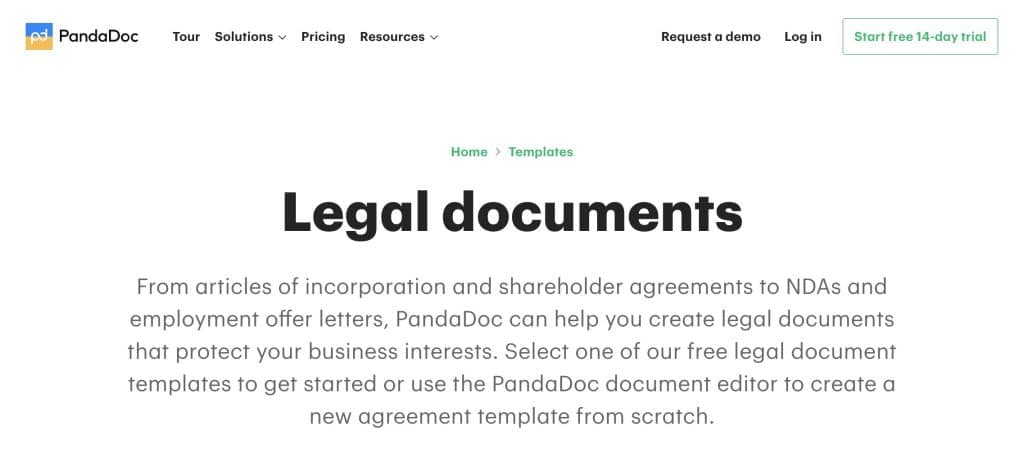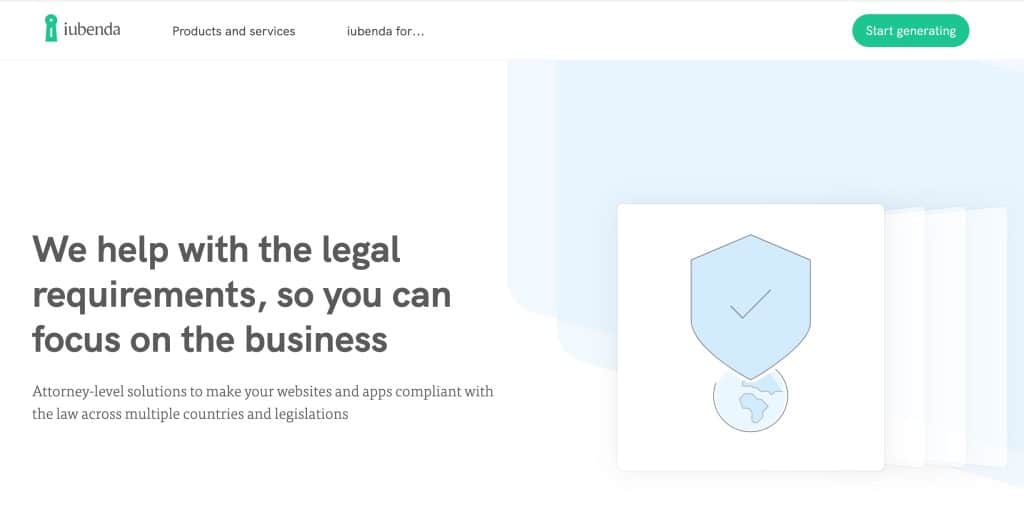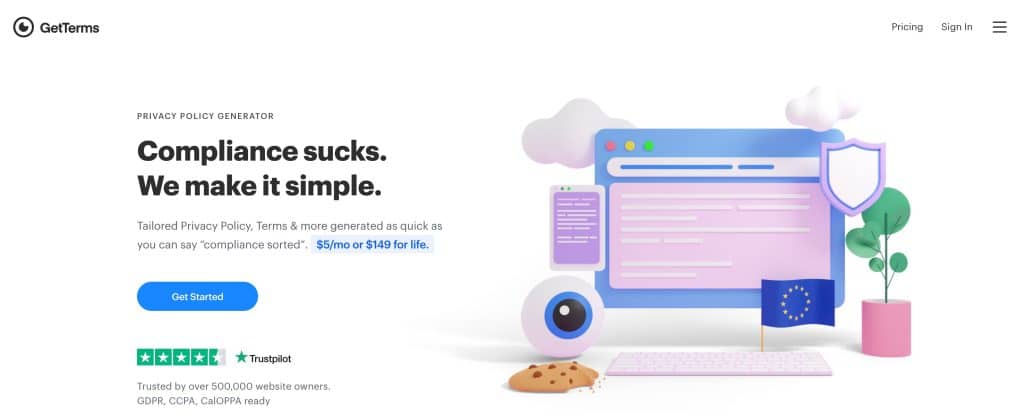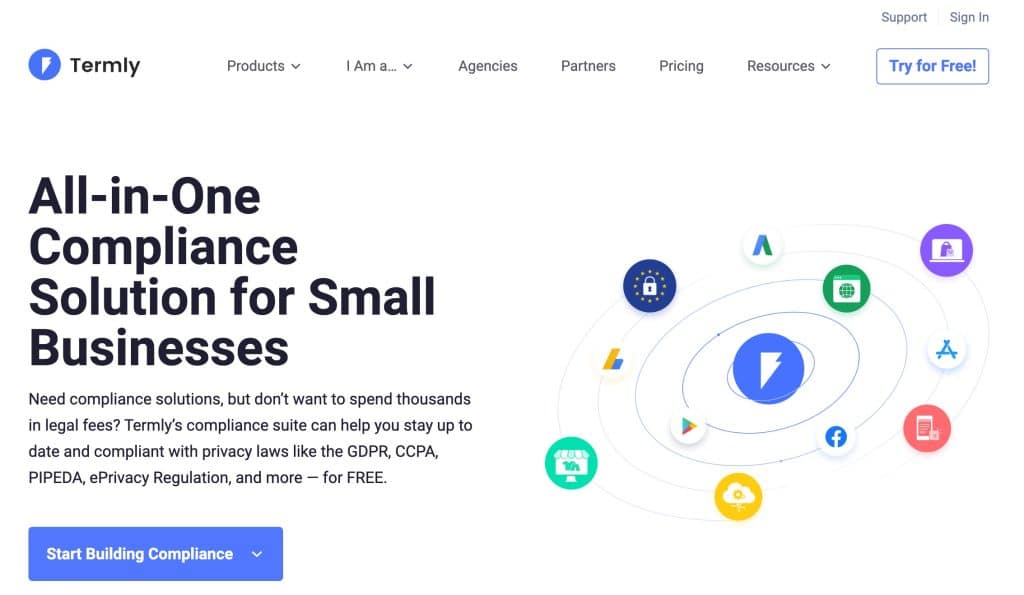If your business involves selling digital products or dealing with customers’ data, you will need to publish legal pages on your website.
Legal pages hold information about your products and services, customers’ data, and the way your business operates on the Internet. In short, they protect both your business and your customers.
There are many options for creating legal content. Let’s learn how you can get started using online tools, a manual approach, or by hiring a professional Lawyer.
- What are legal pages?
- Why are Legal pages important?
- How to create Legal pages for your WordPress website?
- Which method should you use to create legal pages in WordPress?
- Professional Tips
- Final Thoughts
What are legal pages?
Legal pages or legal content cover both your site and your customers. For example, if a site collects users’ information, such as emails, data, or opinions; legal pages hold information, legal rules, and regulations about data collection and handling procedures.
For customers, Legal pages help people hold site owners responsible for data regulation procedures. Where, in case of site owners, Legal pages help them regulate measures for content gaps, theft, or misuse of site’s information.
Examples of legal pages depend on how you collect users’ data, sell a product or service, or protect the site’s assets against culprits. However, Copyright, Disclaimer, Privacy Policy, Cookies Policy, Terms & Conditions, and Refund Policy are examples of legal pages for websites.
Why are Legal pages important?
Legal pages are mandatory for a site that collects users’ data. According to Law, any person or entity with a bad intention to harm, copy, or misuse information on a site can face legal implications.
Below is a list of reasons why legal pages are vital for your WordPress website.
- Without Legal pages, a site doing business in a specific country or region could face legal violation acts.
- Data collection, product selling, and managing financial transactions must abide by local laws and regulations. Your legal pages will outline the steps that you take to ensure that you are complying with local laws.
- Legal pages are used to comply with data protection laws. Not having an appropriate privacy policy could lead to hefty fines.
- Legal pages address, define and explain how your business operates on the Internet. For example, you can let users understand what happens to their data when they input it.
Above are some of the reasons why you need legal pages on your WordPress website. Although the number and types of legal pages depend on your business model, you should always create the basic types of legal pages for your site, including Privacy Policy, Disclaimer, and Terms & Conditions.
How to create Legal pages for your WordPress website?
We will cover a few different approaches to creating legacy content. There are plenty of free and paid options to fit any budget.
Ways to create Legal pages in WordPress
- Manually write your Legal content
- WordPress plugins
- Hire a professional Lawyer
- Legal Page Templates
- Web Tools
Let’s explain the specifics of each method to create legal content.
Create Legal pages manually in WordPress
Creating legal pages manually in WordPress doesn’t cost you money. The way you create simple pages in WordPress, you can also create legal pages in the same manner.
This approach includes creating new Pages in WordPress, followed by writing the legal content yourself. To get started, land on the WordPress Dashboard -> All Pages page and click on the Add New Page button to create a new page.
Here, enter a Page Title based on your Legal requirements, such as Privacy Policy, Terms & Conditions, or Refund Policy in case of creating a Legal page for Refund requests. Next, the body section of the new page should include legal content based on the type of your page. Once finished, you’ve manually created a new legal page in WordPress and are ready to hit the Publish button.
Note: It is a good idea to use a template to get you started if you aren’t sure what your legal content should include.
Use WordPress plugins to create Legal pages

If you want a point-and-click option to create legal pages in WordPress, you can use a plugin such as WP legal pages.
Plugins are a quick and easy way to handle legal content. They can display cookie warning notices and ensure that you are GDPR compliant. As always make sure that the content that the plugin creates is relevant to your business and local laws.
If you’re using a free plugin for Legal pages, you can also get professionals’ assistance by clicking on Support option in the plugin. While this option may vary from plugin to plugin, most of the free options has a premium feature on demand.
Hire a Lawyer to create legal pages in WordPress
Hiring a Lawyer to create your legal content will be the most comprehensive option but also the most costly. Unlike other ways to create legal pages, a Lawyer helps you in person while you’re collecting information for legal pages.
Working with a lawyer to create your legal content will be a timely process. You will need to explain all your business processes and how your site will handle customer data. If you aren’t sure how your site collects and stores data then you may want to consult an expert.
When hiring a lawyer to create legal content for your site, be sure to select a lawyer that knows your industry and local laws inside-out.
Purchase a bundle of Pre-made Legal Page Templates

Like hiring a Lawyer for legal pages, Pre-made Templates also cost you money. In this case, Pre-made Templates come at a small fee and include legal pages for any type of business possible.
Pre-Made Templates are written with Legal information in place. Once bought, making small changes would make legal pages suitable for your website.
Some bundled legal page templates to look at:
For those who are not technical enough and are not aware of legal complications, premium bundles of legal pages can play a vital role in creating legal pages in WordPress.
Use web services to create legal pages
Web services and tools also work in the same manner as WordPress plugins do. Although using Web Tools to create legal pages is an easy option, it can also create technical complications for your business.
If you are not hiring a premium service for legal pages, public tools that help you generate legal templates can create legal pages with a single template. This creates a need to edit templates thoroughly. In case of no editing, content duplication will occur.
To get started, you can enter your business information on a Tool for legal pages. Next, submitting the form will create Legal page templates for your WordPress website.
Services to create legal pages
Here is a list of Services you can find beneficial when creating legal pages for your WordPress website.

Terms Feed
Terms Feed helps you create legal pages with custom options or by using Pre-Made Templates. Terms Feed has both options to create legal pages, Free and Paid.

Iubenda
Iubenda is another tool to solve your legal issues. It helps you create Legal documents for CCPA, GDPR, LGPD, and mobile apps.

Get Terms
Get Terms claims to write human-based legal documents for any business possible. Its human proofreading and checks by professional lawyers make it unique in the pack of its competitors.

Termly
Termly is a great option with both free and paid plans. Note that the plans are monthly or annual so you may find it cheaper to hire a lawyer if you only need basic legal policies.
Which method should you use to create legal pages in WordPress?
Choosing a specific method to create legal pages in WordPress solely depends on your business model.
Hiring a lawyer who specialises in website legal content will always be the best option but can also be the most costly.
Always check that your policy is covering your local laws and the laws in any country that you are selling or operating in.
Professional Tips
While creating legal pages, the following measures will help you avoid content gaps in legal pages.
- If you have created legal pages with a web service make sure to check the content covers your country and local laws.
- You may save money by purchasing templates and having a lawyer optimise them for your business model.
- Check your competitor’s legal pages to get an idea of what you should include.
- Make sure that your legal pages are displayed where necessary. Your privacy policy for example should be visible on all forms that require user data.
Final Thoughts
We hope this article has helped you get started on creating your website’s legal content. Always check with a lawyer if you aren’t sure if your legal content fully covers you.
Need some expert help? Talk to us about your legal content and whether it is fully covering you.





